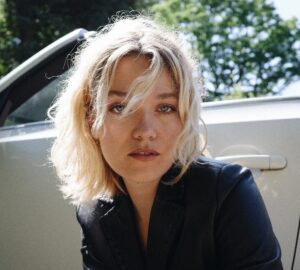Photo Credit: Eddie Whelan
In a musical landscape largely void of whimsical Englishness, Black Country, New Road feels defiantly out of step: a collective of art-school prodigies spinning sprawling, genre-defiant epics that meandered like queues outside Brixton pubs at closing time. Emerging from the Windmill scene alongside Black Midi and Squid, BCNR’s earliest music bent genres to its will – folding klezmer, post-rock, math-rock, and chamber pop into spiralling directions. Their 2021 debut For the First Time was a spiky, urgent announcement; 2022’s Ants from Up There was a wrenching, beautiful collapse – crowned by Isaac Wood’s fragile howl. Both records captured wide acclaim, anchored by violin screeches, saxophone bursts, and Wood’s singular wounded-genius voice – until he up and left, days before Ants was released.
It would have been easy for BCNR to dissolve there and then, especially after losing their central figurehead. Questions loomed not just about whether the band could continue without him, but whether they should. Instead, they pressed on; retiring their old material and hurriedly penning new songs in time for a summer of festival appearances originally planned to promote Ants. With saxophonist Lewis Evans stepping back from vocals as well, BCNR distributed the microphone across three distinct female voices of bassist Tyler Hyde, violinist Georgia Ellery, and keyboardist May Kershaw; effectively stepping away from the marketable anguish that had become their trademark. The result wasn’t bombast, but something warmer; almost defiantly quaint. 2023’s “compilation” Live at Bush Hall hinted at this pivot, offering a folksier, looser snapshot of the band’s interim state.
But Forever Howlong, the band’s first proper studio album post-Wood, feels like a full, permanent chapter. Polished, sequenced, and quietly daring, it asserts not a desperate attempt to reclaim the past, but a delicate reimagining of the band’s heart. Album opener Besties bursts into life with a kaleidoscope of harmonies, at first a giddy ode to friendship before revealing a bittersweet undercurrent of queer longing: “I know I want something more,” Ellery quietly confesses against a soaring, medieval-esque backdrop. Kershaw’s The Big Spin follows with a similarly intimate mood, evoking a homely comfort that curdles slightly as it reflects on human bonds: tangled and frayed with unpredictable structure shifts, but melodically resilient all the same. Socks, penned by Hyde, extends this thread – a luminous love song alive with contradictions, swinging between tender stabs of folk-jazz and dream-pop. Attuned to the album’s recurring themes, it’s a questioning track, rich with layered musings on youth and truth.
Despite its theatrical flourishes and winsome titles, this is no slick pop record. Many of the album’s darker currents are social wounds of a tender, adolescent sort and BCNR let the quiet, devastating power of empathy peer through hilarious, grim links between the fantastical and the mundane. Salem Sisters dances amid vertiginous tempo changes between party paranoia and witch-trial terror; while the Western fever-dream of Two Horses stands among the album’s finest storytelling achievements: mythic yet intimate, it deals with a dusky inversion of the Good Samaritan and ends in violent tragedy: “I watched him kill my horses.” On centrepiece Mary, the trio’s voices entwine fully: a simple, heart-wrenching ballad of schoolyard cruelty, delivered with almost childlike directness and a primitive recorder solo.
Throughout Forever Howlong, many songs feel as if they are sung in character, often swaying with the theatricality of show tunes. The exuberant Happy Birthday offers another tonal pivot, presenting a voice that seems to belittle and invalidate the narrator’s despair – a chilling portrayal of inner and outer conflict, wrapped in striking, dramatic arrangements. Whether internalised self-criticism or an external antagonist, the emotional struggle presented is palpable. For the Cold Country stands as the album’s emotional anchor, where Kershaw crafts an expansive narrative about a battle-worn knight seeking vulnerability after years of conflict – a rich metaphor for shedding emotional armour. The medieval-folk infused track steadily builds around sparse droning, climaxing in a shattering cry: “Are you there? Can you see me?”
Hyde’s ferocious Nancy Tries to Take the Night reflects on lived female desperation and despair with intricate ostinatos and brutal honesty – its soaring strings and saxophone leads are grounded by her resonant alto voice; elevating the entire thing into a fevered, breathtaking highlight. Meanwhile, the Kershaw-penned title track drifts like a dream with its oddball ruminations on beans, vitamin B, and gut health unfurling across a surreal thicket of strings and fluttering recorders. Closer Goodbye (Don’t Tell Me) finds Ellery’s aching minimalism swept under an elongated sense of yearning: “I’ve fallen in love with a fear I believe in.” Harmony isn’t just a motif here, if not the buoy to the band’s survival story. Where BCNR once they erupted into ecstatic climaxes, now they hover, drift, and withhold.
The songs on Forever Howlong don’t demand attention; they seduce it. Gone is the cryptic despair and alluring immediacy of Wood’s era – in its place is now a melodic vulnerability of the female perspective. If BCNR’s earlier work captured collapse rendered sublime, their latest effort is the sound of a band not just enduring change, but flourishing because of it – with harmonies that once lingered in the margins, now stepping boldly into the spotlight. And for a band that once defined themselves by how spectacularly they could hurt, there’s something even more profound in seeing them persevere with tenderness over myth-making.
8/10
Standout Tracks: The Big Spin, Two Horses, For the Cold Country
For Fans Of: Geordie Greep, Big Thief, Courting
Written by: Dimitris Vasileias




